Insights
GM LEP supports launch of £25m Christabel Pankhurst Institute for Health Technology Research and Innovation
Supported by GM LEP funding via the Local Growth Fund, the Christabel Pankhurst Institute will build on Greater Manchester’s strengths in health innovation and advanced materials
A new multimillion-pound research institute that will maximise Manchester’s academic strengths in digital health and advanced materials to speed the delivery of innovative health and care solutions is being launched this week.
A consortium led by the University of Manchester is behind the Christabel Pankhurst Institute for Health Technology Research and Innovation, a £25m initiative to promote needs-led health technology research and innovation. It will provide end-to-end support for translation of research into practice and act as an external flagship for the university’s rapidly expanding health technology portfolio.
A unique partnership between the university, NHS, business and local government, the aim of the collaboration is to capitalise on the university’s strengths in digital health and advanced materials and develop innovative products and services for the health care sector. In turn this will drive business growth and employment as well as boost the long-term health benefits of the city region.
The consortium comprises the University of Manchester, Manchester Science Partnerships, Manchester University NHS Foundation Trust, and Health Innovation Manchester.
The institute is housed in a flagship building at the centre of the university’s campus on the Oxford Road Corridor, as well as having bespoke, state-of-the-art research and business development spaces at Manchester Science Partnerships’ Citylabs campus.
Its name celebrates the connection between the university and Dame Christabel Pankhurst, co-founder of the Women’s Social and Political Movement and a driving force behind the suffragette movement, one of the most significant social reforms of the 20th century. As well as honouring a distinguished alumna, the name also demonstrates the university’s commitment to redress the under-representation of women and other groups in science and academic leadership through its equality, diversity and inclusion action plan.
The institute received a £5m award from the Local Growth Fund managed by Greater Manchester Local Enterprise Partnership and is part of an ambitious plan set out in the Greater Manchester Local Industrial Strategy to boost the city-region’s provision in health innovation and advanced materials. Investments from the university, Manchester Science Partnerships, the Engineering and Physical Sciences Research Council, and The Alan Turing Institute, make up the total budget of £25m.
President and Vice-Chancellor at The University of Manchester, Professor Dame Nancy Rothwell, a GM LEP board member, said:
“This is a really exciting opportunity to work with our partners to exploit the University’s strengths in digital health and advanced materials to make a real difference to the health and economic development of Greater Manchester.”
Rowena Burns, Chair of Manchester Science Partnerships, said:
“The University of Manchester is at the leading edge of research which will transform our ability to predict and prevent disease. The Pankhurst Institute will provide a dedicated facility for bringing this research together and play a key role in shortening the journey from academic discovery to world-leading industry innovation.”
Lou Cordwell, Co-Chair of the Greater Manchester Local Enterprise Partnership, said:
“The Greater Manchester Local Enterprise Partnership is proud to support the Christabel Pankhurst Institute for Health Technology and Innovation with a £5 million award from the Local Growth Fund. Health innovation is central to both the Greater Manchester Local Industrial Strategy and the recently launched Economic Vision. We’re excited by the institute’s potential to translate world-class research into economic growth, creating jobs and stimulating investment in a sector where some of our biggest opportunities lie.”
The institute will play a critical role in pulling innovations through from basic research to market ready products and services, which can then be accelerated into clinical use through Greater Manchester’s devolved health and care system and established innovation pathway. To achieve this it will build on, integrate and enhance the already extensive support provided by the partners.
The Christabel Pankhurst Institute for Health Technology Research and Innovation
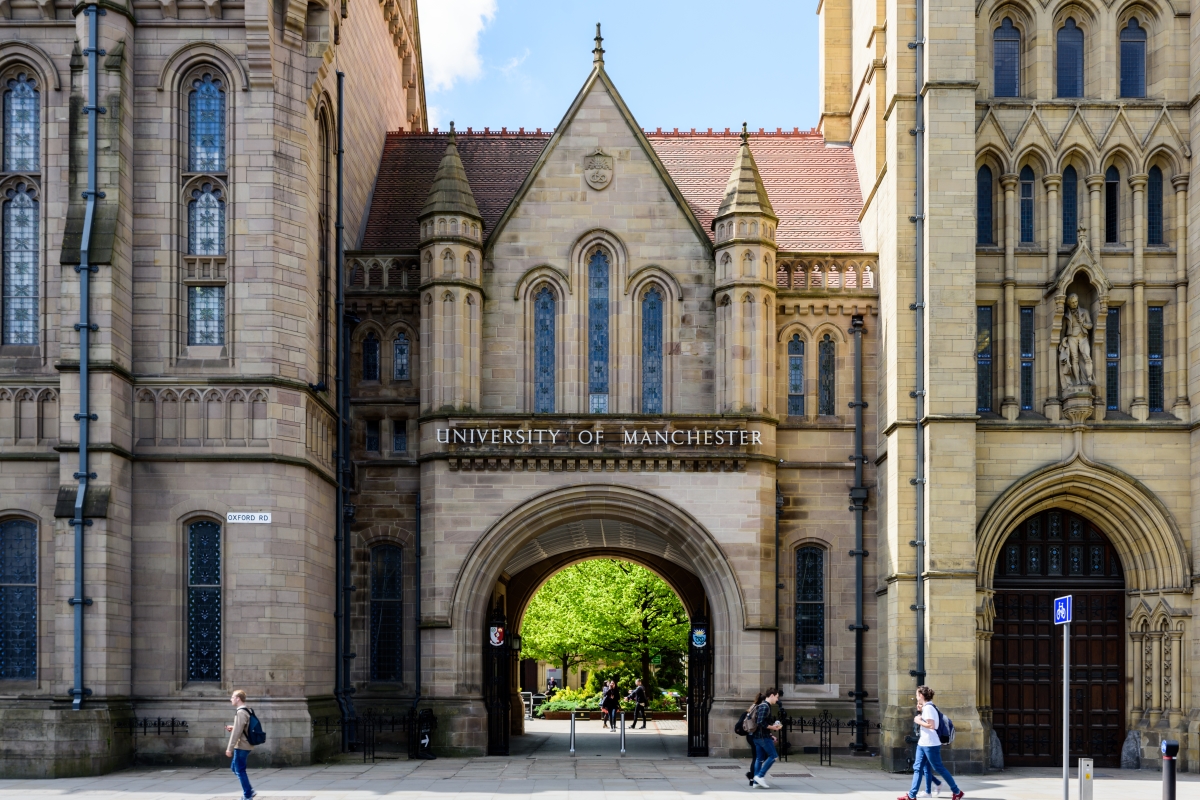
The University of Manchester
Graphene can be the catalyst that drives the sustainable transport revolution
Supported by GM LEP investment, Greater Manchester is working to unlock the potential of graphene and other 2D materials. James Baker is Chief Executive of Graphene@Manchester, which leads business-facing development of graphene and 2D materials at The University of Manchester. Graphene@Manchester includes the National Graphene Institute and Graphene Engineering Innovation Centre. Here Baker talks about the potential for graphene to drive the sustainable transport revolution.
The aerospace and auto sectors are having to respond to two unprecedented global crises – COVID-19 and climate change.
The COVID pandemic has decimated international air travel and so impacted the aerospace industry, which is now forced into making huge layoffs. The situation is just as challenging for carmakers in many parts of the world.
These industries now have a make-or-break opportunity to use the COVID challenge as a catalyst to accelerate the innovation cycle and, in doing so, look to become more sustainable and greener sectors.
This is prompting a drive to have more environmentally friendly vehicles by the mid-2030s – to do that, we’ll need to move away from conventional fuel-guzzling and polluting engines into, say, hydrogen or electric hybrids in the case of aircraft and most certainly electrification for automobiles.
Vehicles of the future will also need to be lighter in weight so they can have longer range, while using less fuel, producing less emissions and generating less noise.
Graphene and 2D materials can play a key role in supporting this huge ambition to produce greener aircraft and cars by the mid-2030s. But manufacturers and their respective supply chains will have to operate very differently than they have done traditionally.
Material Acceleration
If I focus on the aerospace sector – the industry where I started my own career – I would say that historically innovation in materials, for example carbon fiber, has taken many years from discovery through to prototype, through to production, through to mass production.
Post-COVID we will all have to do things differently and there is now a real opportunity to adopt revolutionary advanced materials by working closely with the aerospace supply chain and operate in a much more aggressive ‘make or break’ way.
For example, we can add graphene into a composite to see how we optimise that mix. If our experiments fail, then we ‘fail fast, learn fast’ – that is, we discover quickly what went wrong, fix it and move on quickly to drive rapid innovation.
We cannot underestimate the challenges ahead – but I can see some real opportunities here and the aerospace sector is now likely to be a pioneer and early adopter when once it was very conservative in embracing new technology at pace.
This fast-track pathway was already being laid out. A couple of years ago I helped produce a strategy paper with the Aerospace Technology Institute (ATI), which is responsible for the technology strategy for the UK aerospace sector.
Collaboration across the supply chain
Even before COVID, we recognised the need for restructure to meet the global environmental challenges. The ATI-Manchester joint INSIGHTS paper was produced in consultation with a range of stakeholders and highlighted the potential of graphene to positively impact on aircraft performance, cost and fuel efficiency.
The recommendation was to work with the existing supply chain to incorporate graphene into materials already used to build planes. The collaboration between industry and academia was cited as being crucial in the R&D ambition.
And this industry-academia partnership is exemplified with how the Graphene Engineering Innovation Centre (GEIC) – the graphene commercialisation accelerator based at The University of Manchester – is working with some of its key commercial partners including GKN Aerospace and Versarien.
GKN Aerospace – one of the world’s leading suppliers of manufacturing to the aerospace industry – is working with Manchester to explore multiple areas of 2D materials application, including the use of graphene in innovative coatings for aerospace applications and development of new composite materials.
GKN supplies products to 90% of the world’s aircraft and engine manufacturers, so we have an opportunity to make a genuine difference to the next generation of lighter, more sustainable aircraft through innovation in 2D materials.
Meanwhile, Versarien, like GKN a Tier 1 partner of the GEIC, is working with Manchester on a project with Rolls-Royce as part of a programme to help apply graphene and other 2D materials into next-generation aerospace engine systems.
Lower costs and emissions
The companies will seek to use the unique properties of these advanced materials to reduce the weight of electrical components, improve electrical performance and also increase resistance to corrosion of components in future engine systems – so lowering cost, as well reducing energy and engine emissions.
In these case studies the GEIC, with its ‘fail fast, learn fast’ philosophy, is providing the catalyst to these companies as they look to pull innovation though the aerospace supply chain. And this acceleration can just as easily be applied to the automotive supply chain, which in fact, often overlaps with the aerospace ecosystem as their manufacturing needs are similar.
This Manchester model of materials innovation, I believe, could provide the answer to the aero and auto sectors as they respond effectively to COVID and become fit-for-purpose in a world that will demand sustainable manufacture and products.
This article has previously appeared on investinmanchester.com.
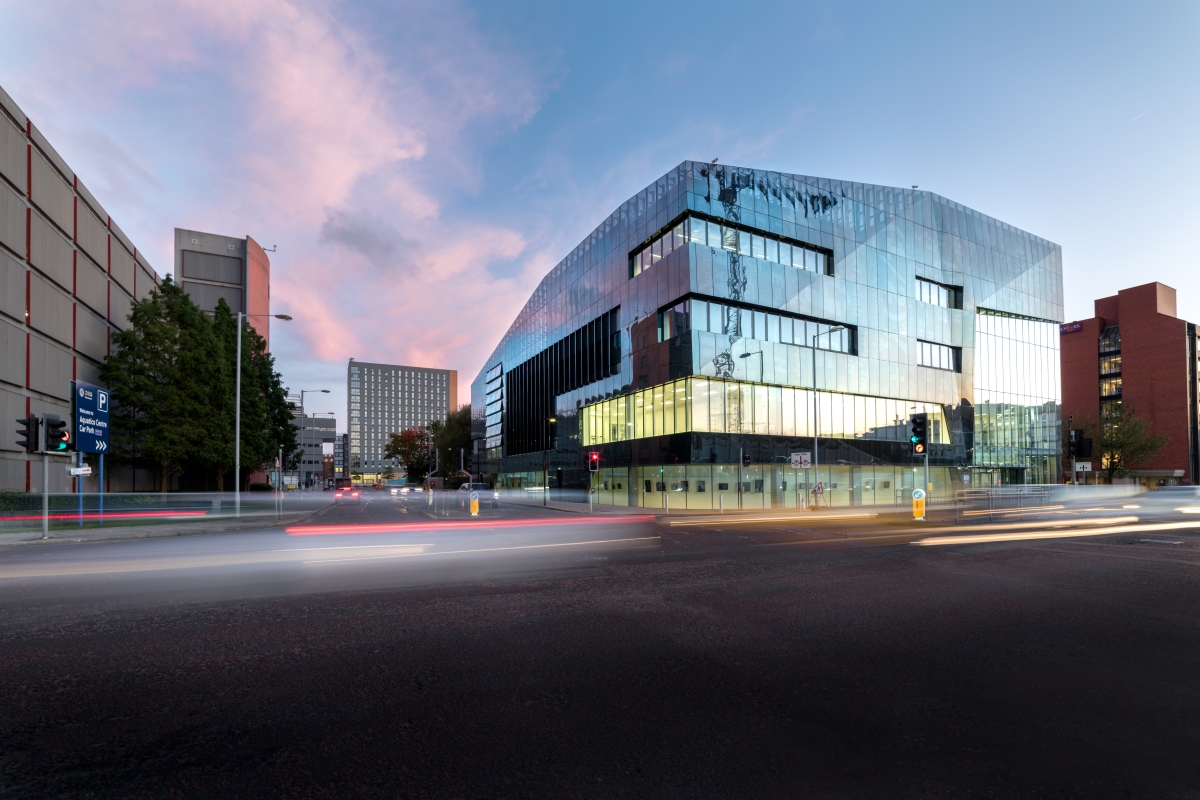
National Graphene Institute
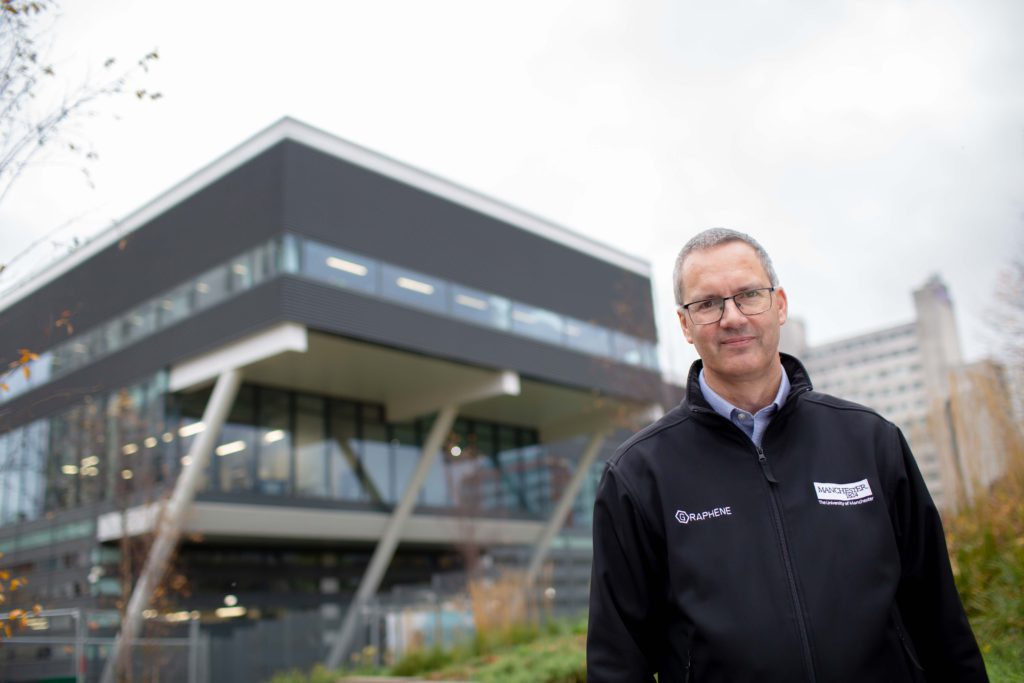
James Baker, Chief Executive of Graphene@Manchester
Inside the Graphene Engineering Innovation Centre
Coronation Street set the scene for Greater Manchester’s world-class digital, creative and tech sector of today
By Lou Cordwell, Co-Chair Greater Manchester Local Enterprise Partnership
For all the drama and shouting, through decades of kissing and making up, nothing much appears to have changed in Coronation Street, which still reflects life in the fictional Manchester suburb of Weatherfield, as it has done now for 60 years.
From the imagination of visionary Salford scriptwriter Tony Warren came a serial drama which has proven to be the world’s most resilient soap, still enchanting audiences the world over, providing insight into other people’s lives as a distraction to the reality of our own.
But as we pause to congratulate ITV on 60 glorious years of Coronation Street, it’s also worth considering the true legacy of this unique and continuing experiment in technology and storytelling.
While the cobbles might be intact and the Rovers still serves pints of warm bitter, Coronation Street can arguably be held up as a catalyst for Greater Manchester’s emergence as a powerhouse in the creative, digital and technology sectors.
Rewind to December 9 1960, when a young William Roache appeared alongside screen parents Frank Pemberton and Noel Dyson in the first ever scene in the first ever episode of Coronation Street. It was a ground-breaking moment in media, with that first black and white episode transmitted live into 3.5m homes.
Only six years earlier, Sidney Bernstein had founded Granada Studios in Manchester, one of the original four Independent Television Authority franchisees, and the regional television company for the North West had discovered a winning formula which would underpin the creative spirits of the region.
Alongside the commotion on the cobbles, Granada Television would give us World In Action, Sherlock Holmes, Stars In Their Eyes, So It Goes, sparking the stellar careers of Russell T Davies, Nicola Shindler, Paul Abbott, Kay Mellor, Sir Michael Parkinson and Tony Wilson.
Talent that might previously have left for London carved a career here, fuelling the spirit of innovation that we’re famous for today.
Look across Greater Manchester’s burgeoning digital, creative and tech sector and you could argue that it thrives partly due to the pioneering spirit of Sidney Bernstein’s sense of the opportunities outside London; through Tony Warren’s creativity; the brassy vulnerability of Bet Lynch; Mike Baldwin’s ‘entrepreneurial’ spirt; the continuing drama of Yasmeen Nazir being found not guilty of attempting to murder abusive husband Geoff Metcalfe (a recent storyline if you’ve not been tuning in).
Audience numbers have been fragmented by additional channels and distractions on our time, but Corrie still averages an incredible 6-7 million viewers per episode, as well engaging with fans online via social media, and in person at the studio tour.
Relocated from its original home in Quay Street to a state-of-art production facility at MediaCityUK, Coronation Street is still powered by the same brilliant screenwriting, acerbic humour and warmth.
Viewers probably don’t (and aren’t meant to) realise that Corrie today is a far cry from the black and white creation seen in 1960. Its cameras are 4K and its broadcast facilities second to none, the largest single TV production site in the world.
But Corrie’s impact lies beyond the ITV Studio on the Trafford side of the Ship Canal. It’s felt across MediaCityUK, which is also home to the BBC’s Northern outpost; the University of Salford campus cultivating the next generation of media talent; and into tech businesses like BUPA and TalkTalk, which are today’s creative businesses.
And it’s felt across Greater Manchester. Famously composed by Eric Spear more than half a century ago, Corrie’s theme music should still resonate with the young people embarking on digital and creative careers via FutureSkills, Sharp Futures, or Ada Manchester, a new outpost for the National College for Digital Skills. Supported by Greater Manchester Local Enterprise Partnership, we’ll soon build on our capabilities with the exciting new School of Digital Arts – SODA – at Manchester Metropolitan University.
Corrie must take at least some credit for Greater Manchester today being recognised as one of Europe’s largest creative digital and technology clusters, home to a fast-growing £5bn digital ecosystem.
Greater Manchester is home to Europe’s largest purpose-built digital hub, MediaCityUK, and with a heritage of broadcast and media production, marketing and advertising as well as specialist skills in service design, animation, gaming, augmented and virtual realities. Greater Manchester is a place where creativity and technology are jointly driving the next wave of innovation in the creative and media industries.
Greater Manchester’s thriving creative, digital and technology community of more than 10,000 businesses now includes businesses like The Hut Group and AO.com. The ecosystem comprises companies at all stages, from start-ups and SMEs to global brands and homegrown unicorns that IPO above $1 billion; all of which converge and collaborate in the city’s creative, digital and media hubs.
Our emerging strengths in digital and tech aren’t really new at all. They’re just the latest chapter in a celebrated saga that’s being playing out for generations, constantly evolving, reacting to the times, believing in people and innovating to achieve better while never forgetting its roots.
Congratulations to Coronation Street. Here’s to many more years of creativity and talent in Greater Manchester.
Go to www.gmlep.com/insights to find out more about the work of Greater Manchester Local Enterprise Partnership
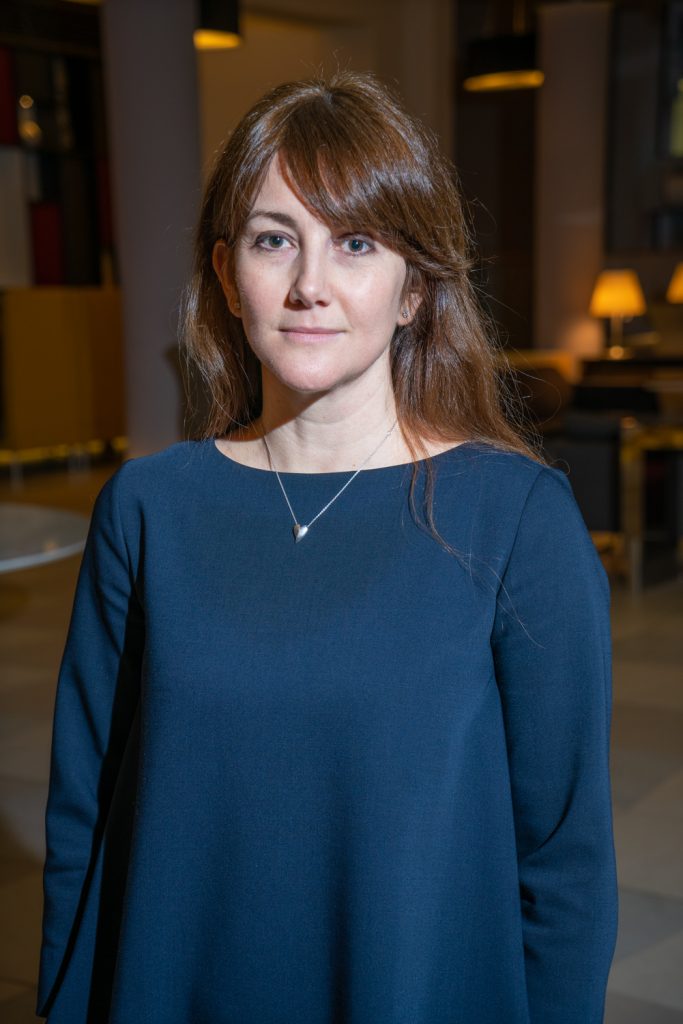
Lou Cordwell, Co-Chair Greater Manchester Local Enterprise Partnership
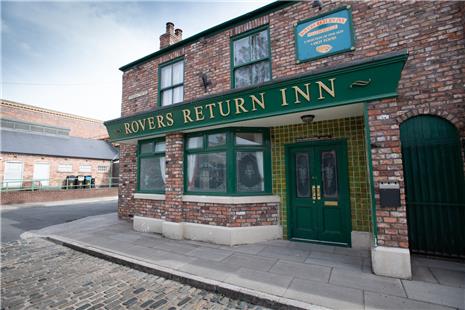
Rovers Return Inn, Coronation Street
Pedal power and the cycle of success behind Greater Manchester’s green transport goals
Greater Manchester is building on its international reputation for cycling success with a vision to encourage green transport and economic growth. Supported by GM LEP investment, the city-region is pedalling towards green growth and a more sustainable future.
It became known the world over as the Medal Factory, forging incredible international success for British Cycling while demonstrating the benefit of visionary investment in world-class infrastructure.
Opened in 1994 as a joint venture between Sport England, Manchester City Council and British Cycling, the Manchester Velodrome was the UK’s first indoor Olympic-standard cycling track.
Athletes trained at Manchester Velodrome secured 14 out of 20 potential gold medals at the Olympic Games in 2008 and 2012.
It contributed massively to the stellar careers of British athletes including Victoria Pendleton, Sir Chris Hoy and Chris Boardman, who today serves as Greater Manchester’s walking and cycling czar.
Now part of the HSBC National Cycling Centre, Manchester Velodrome arguably began the cycling revolution which has taken on even greater significance as the threat of climate change looms large over cities.
At a time when the UK Government has acknowledged the importance of walking and cycling as part of the Green Industrial Revolution, Greater Manchester is already geared up for green growth.
What started on the track continues on the streets as Greater Manchester bids to meet an ambitious goal to achieve carbon neutrality by 2038.
It was two years ago that Chris Boardman first unveiled his bold £1.5bn, 10-year plan for 1,800 miles of cycling and walking routes across Greater Manchester.
Speaking at the time, Boardman said: “There’s no doubt that this is an incredibly ambitious but wholly deliverable plan to get Greater Manchester moving by bike and walking.
“The Mayor of Greater Manchester tasked me with thinking creatively, challenging assumptions and pushing the boundaries of what should be possible. My proposals, the product of many months of work, will ease congestion on our overcrowded roads, improve our general health and wellbeing and help us breathe cleaner air in a greener city-region.
“It will require significant support but the decades of improved living that we, our children and grandchildren will be able enjoy will make it worthwhile.”
Supporting this vision, plans are in place to enhance the city-region as a UK leader in cycling and walking, and investment in new infrastructure aims to pave the way for the region to achieve its green goals.
Back in 2018, Greater Manchester Combined Authority agreed to allocate £160m of Greater Manchester’s £243m Transforming Cities Fund to develop a Mayor’s Cycling and Walking Challenge Fund (MCF).
Helping the region reach its goals, Greater Manchester Local Enterprise Partnership (GM LEP) has provided £30.5m funding from the Local Growth Fund, which includes a £13.4m investment in cycling infrastructure, and a further £17.1m provided for walking.
The pandemic has provided clear evidence not only for the environmental benefits cycling and walking brings by reducing carbon emissions, but also the wellbeing benefits of improved physical and mental health for the residents of Greater Manchester.
There are other potential economic benefits too, with India’s Hero Cycles (see case study) among businesses keen to invest in a region with a rich history of innovation and sport. In part, they were attracted by the opportunity to work alongside scientists developing new applications for graphene and other 2D materials.
In line with the recently unveiled GM Economic Vision, which supports green growth, the region aims to re-think the way residents and visitors move around to cut congestion, air pollution and keep people active.
Part of the new investment by GM LEP will support the city-region’s post-Covid ambitions, with funding supporting projects to increase cycling and walking road space, contributing to lower emissions, and building the infrastructure that encourages residents to prioritise walking and cycling as a green and healthy way to travel.
Covid-19 has given opportunities for cities like Manchester to experiment, and throughout the UK lockdown both Deansgate, the city’s main thoroughfare; and Stevenson Square in the Northern Quarter have temporarily been pedestrianised to allow for greater accessibility to residents and to help with social distancing.
Plans are now under discussion to make the two sites permanent pedestrian zones to allow for more Continental-style on-street seating and walking provisions. Elsewhere, as part of the Town Hall renovation project, work is now fully underway for the expansion of Albert Square, which will ban through traffic and enlarge the square by 20 per cent to allow for pedestrians, events and increased seating.
Key among Chris Boardman’s ambitions is the Bee Network, which is the walking and cycling element of the Our Network plan to transform Greater Manchester’s transport system.
The Bee Network, once complete, will cover circa 1,800 miles and be the longest, integrated, planned network in the country connecting every neighbourhood of Greater Manchester.
The aim of the network is to reduce the 250 million car journeys made by people in the region that are less than the equivalent of a 15-minute walk or 5-minute cycle ride.
In November 2020, Greater Manchester was successful in securing almost £16m from the Government’s active travel fund for schemes to deliver cycling and walking routes and low traffic neighbourhoods. This is in addition to £3.1 million granted to the city-region in July 2020.
Cycling and walking routes are already being delivered by local authorities across Greater Manchester with a commitment to deliver 55 miles by December 2021.
Making cycling and walking more attractive is one of the measures outlined in Prime Minister Boris Johnson’s Ten Point Plan for a Green Industrial Revolution for 250,000 jobs.
Supported by GM LEP, the cycling and walking revolution is already well underway in Greater Manchester.
“GM LEP has provided funding to support the development of infrastructure across Greater Manchester, which will not only improve the lives of residents but offer a key driver for investors to look to relocate to the region, bringing jobs and boosting the economy, which will allow greater investment in future green projects,” said Lou Cordwell, Co-chair of GM LEP.
“Not only is cycling and walking incredibly important to mental health and wellbeing, it is also part of our ambition to build back better and supports green growth, one of the priorities within the new GM Economic Vision.”
Case study: Hero Cycles
As the UK’s fastest-growing economy outside of London, and the most successful city in the UK for attracting Foreign Direct Investment, Manchester has caught the attention of international investors, who are attracted to the city-region for its growing infrastructure, expertise, and availability of creative talent.
India’s Hero Cycles, the world’s biggest manufacturer of bicycles, established their Global Design Centre in Manchester in 2017 to access the talent – for R&D and design – and to collaborate with the World Class universities in the region, the local Government and Transport for Greater Manchester – to develop and demonstrate micro-mobility and e-bike solutions.
Pankaj Munjal – Chairman and Managing Director of Hero, said: “A presence in Greater Manchester gives us access to talent and testbeds – it’s a City Region committed to Carbon Neutrality by 2038, and one that’s taking action to hit this goal.
“This gives innovative companies opportunities to develop and pilot new products, demonstrating them at scale and gaining competitive advantage. Every time I am in Manchester I am excited and inspired by what I see!”
To find out more about Greater Manchester Local Enterprise Partnership’s Economic Vision for a fairer, greener, growing economy go to www.gmlep.com/economicvision.
Pedal power and the cycle of success behind Greater Manchester’s green transport goals

Cyclist at the HSBC UK National Cycling Centre
Greater Manchester can support female entrepreneurs in boosting the UK economy
By Lou Cordwell, GM LEP Co-Chair and founder and CEO of digital studio magneticNorth; and Cllr Elise Wilson, GM LEP board member, leader of Stockport Council, and GMCA economy portfolio lead
The Alison Rose Review of Female Entrepreneurship recently found that £250bn of new value could be added to the UK economy if women were supported in starting and scaling new businesses at the same rate as men.
Based on pre-pandemic research, it found that only one in three UK entrepreneurs is female; that fewer UK women choose to become entrepreneurs than in best practice peer countries; and that perceived bias within the UK venture finance community is a concern.
The review recommended an increase in funding directed towards female entrepreneurs; Greater family care support for female entrepreneurs; and making entrepreneurship more accessible for women and increasing support locally, through relatable and accessible mentors and networks.
The Institute of Fiscal Studies suggests that the plight of female founders has been further hit by coronavirus, with women more likely to work in the worst affected sectors, and to have served as primary care providers at a point when many children were being home schooled.
The good news is that work is already underway in Greater Manchester to address these inequalities.
We know that economic and entrepreneurial diversity pays dividends, improving business outcomes while supporting social mobility and opportunity.
Diversity provides different perspectives, fresh insight, complementary skills and experience. Equally, providing opportunities for more entrepreneurs to create jobs and prosperity is vital if we are to level up.
At the heart of the new GM Economic Vision is a commitment to tackling inequalities, with a focus on supporting more women in starting and growing businesses through a world-leading programme of female entrepreneurship.
We are committed to enabling people to reach their full potential through training and mentoring, encouraging diversity and inclusivity in company leadership through initiatives including provision of innovative finance.
We already have strong female leaders in prominent positions across Greater Manchester, but we know that there’s more we can do to inspire and encourage the next generation of female entrepreneurs.
Greater Manchester is ideally placed to implement measures that will support a new generation of female entrepreneurs, and is ready to take the lead nationally, supporting Government in capitalising on the clear economic advantages that would bring.
According to the Business Growth Hub’s (BGH) Inclusive Growth Report, of the 1623 data records captured, 23.9% of owners were classed as female owned. More than half (52.9%) of the individuals supported by BGH in Greater Manchester to start a business 52.9% were female.
Diversity is a central tenet of the Greater Manchester Good Employment Charter, which includes a commitment from employers to take full advantage of the diversity and talents across Greater Manchester communities, invest in workforce training and development, and provide employees with an opportunity to work flexibly wherever possible.
The strength of existing entrepreneurial talent is evident in initiatives including Northern Power Women and the research conducted by NatWest/RBS in 2015, which showed Manchester’s female-led businesses contributed £124m to the UK’s economy and created an additional 3,300 jobs in 2015.
With only 1p in every £1 invested going to female-led businesses nationally, funding provided to female founders by GC Angels demonstrates that Greater Manchester is leading the way in dramatically helping to reverse shameful gender inequalities.
Supported by GM LEP funding, businesses with a women founder have raised £5.7m in total into funding rounds that GC Angels have invested into, 62% of all capital raised since 2018.
According to GC Angels,
- Women in its funding portfolio raise an average of £444k
- Businesses with a women founder make up 52% of its portfolio since 2018
- Businesses with a women founder received 41% of its funding to date since 2018
Successful funding for female founders includes Culture Shift, which is giving victims of sexual harassment a platform to report crime.
As a result of £3m being made available by GMCA and the GM LEP, female-founded businesses have been able to access Early-Stage Investment through the Local Growth Fund delivered by GC Angels.
Public sector initiatives including Innovate Her and Go Digital are building an integrated pipeline of skills and talent among young women at our schools and colleges, while our five universities produce female graduates who form spin-out companies to commercialise the incredible potential of their academic research.
A statue of Emmeline Pankhurst now stands proudly in Manchester’s St Peter’s Square, celebrating a century of women’s suffrage. Diversity is part of our DNA and that has informed decades of innovation and awareness of the importance of encouraging young women into business.
We’re already supporting the entrepreneurial ecosystem of Greater Manchester, investing in the next generation of female entrepreneurs, while recognising the significant number of women leaving the labour market due to Covid-19 and the female founder gap in the North of England.
Greater Manchester is arguably better placed than anywhere else to champion the virtuous circle that might be achieved if women were supported in boosting the economy, in turn providing jobs and opportunities for others.
The empowerment of female founders is an opportunity too big to miss and Greater Manchester is poised to seize it.
Find out more about GM’s Economic Vision for a fairer, greener, growing economy at www.GMLEP.com/economicvision

Cllr Elise Wilson, GM LEP board member, leader of Stockport Council, and GMCA economy portfolio lead
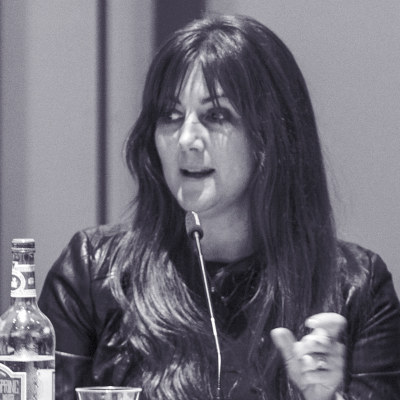
Lou Cordwell, GM LEP Co-Chair and founder and CEO of digital studio magneticNorth
SODA sets the scene for the future of digital and creative
Supported by Greater Manchester Local Enterprise Partnership investment, the new School of Digital Arts (SODA) at Manchester Metropolitan University will build on the region’s rich tradition of digital, media, skills, technology and innovation.
On the back of recognition as one of Europe’s largest creative, digital and technology clusters, home to more than 10,000 businesses – from start-ups and SMEs to global brands – the demand for specialist skills and talents has increased sharply across Greater Manchester in recent years.
With a prolific heritage in broadcast and media production that started with Granada TV through to major investment in the likes of MediaCityUK, the Sharp Project, and innovation zones including the Salford Innovation Triangle, Greater Manchester is a place where creativity and technology are jointly driving the next wave of innovation in the creative and media industries.
Addressing an urgent demand for skills in the sector and building on this reputation, Manchester Metropolitan University (MMU) is creating a new academic centre, the School of Digital Arts (SODA), which will nurture the future talent of the industry, readying them for the world of work.
The £35m school offers purpose-built facilities allowing students to become qualified in subjects including animation, filmmaking, photography, UX, games design, sound, media production and AI, and expects to produce over 1,000 graduates every year.
The school has received £14.9m in funding from the Local Growth Fund via the Greater Manchester Local Enterprise Partnership and Greater Manchester Combined Authority. Together they have jointly committed to investing in Greater Manchester’s digital future to support jobs, skills and economic growth.
Greater Manchester is the UK’s largest tech hub outside of London, and supports 86,000 digital, creative and tech jobs. With demand growing every year SODA aims to develop expert graduates who will spend part of their studies embedded within the region’s £5 billion digital ecosystem through live projects with industry partners in a bid to retain talent after graduation.
The School – which will welcome its first cohort of students in September 2021 – will be shaped and led by some of the world’s leading experts, two of whom have strong ties to Greater Manchester, where they started their successful careers.
Academy award-winning director Danny Boyle (Slumdog Millionaire, Trainspotting and Shallow Grave), who grew up studying in Bolton will be co-chair of SODA’s industry advisory group alongside Nicola Shindler. Originally from Rochdale, Shindler started her career in television at Granada Studios before founding Red Productions which has produced some of Britain’s most popular series, both filmed and set in Manchester, including Queer as Folk, Happy Valley, Last Tango in Halifax and international smash hit The Stranger.
Boyle and Shindler will shape the School’s academic learning and provide invaluable industry expertise for students along other members from organisation such as the BBC, Channel Four, Sharp Futures, Universal Music, Apple, HOME arts centre and Sony VR.
Lou Cordwell OBE, Co-Chair of the Greater Manchester Local Enterprise Partnership, and founder of Manchester’s magneticNorth digital design studio, said: “In partnership with GMCA, the GM LEP is proud to invest £14.9m of the Local Growth Fund into the School Of Digital Arts, a purpose-built facility for one of the UK’s leading modern universities.
“The Greater Manchester Local Industrial Strategy is our plan to deliver an economy fit for the future, with prosperous communities across the city-region and radically increased productivity and earning power. This project showcases one of the ways we can realise that vision: strengthening our creative, digital and media industries by generating the digitally skilled workforce of tomorrow.
“SODA reflects the scale of Greater Manchester’s digital burgeoning digital sector and ambition as well as our ongoing commitment to inclusive growth. As is the Manchester way, the private sector will continue to play an integral role in ensuring that the city region’s creative and digital sector continues to thrive and that drive a growth in opportunities for everyone.”
Professor Toby Heys, Head of SODA, said:
“Our ambition is to become a world leader in digital arts, producing the next generation of creative talent which will drive regional growth in this rapidly expanding area.
“The involvement of internationally acclaimed media figures on our External Advisory Group is hugely exciting for us and will help to ensure that everything SODA does is attuned to the needs of our creative and digital sector.”
The arrival of SODA will be a landmark moment for Greater Manchester as the sector recovers and rebuilds from the disruption caused by Covid-19. The school will be a powerhouse for digital arts; driving ideas and innovation across all forms of creative content, and in doing so, future proofing a rich and long legacy of creativity.
